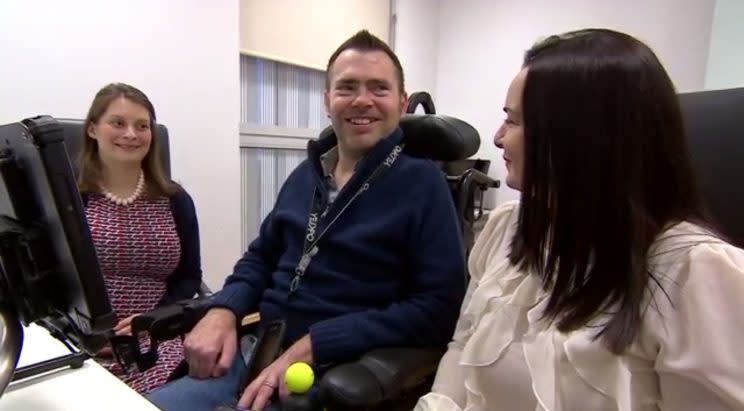Technology helps motor neurone sufferer keep his Yorkshire accent despite losing ability to speak

A 41-year-old father with motor neurone disease is keeping his Yorkshire accent despite losing the ability to speak.
Jason Liversidge, from Scarborough in North Yorkshire, is using pioneering technology to communicate in his own accent.
Based on a similar system to the one used by Professor Stephen Hawking, experts have created an accented voice for the first time.
MORE: Burglar jailed after brave mum and daughter chase him out of house
MORE: BMW driver pulled from the water after sat nav leads him straight into a RIVER
Mr Liversidge was diagnosed with motor neurone disease in 2014 and is slowly losing the ability to speak.
But instead of giving him a computer-generated voice, specialists have created a voice with a Yorkshire accent.

Mr Liversidge’s new voice is based on a recording of a speech he gave at his sister’s wedding and the sounds of a number of other contributors with Yorkshire accents, including his best friend, Phil White.
Donor voices were needed because Mr Liversidge’s speech is already slurred.
Speaking to BBC Inside Out Yorkshire and Lincolnshire, Mr Liversidge said he was hoping to keep his voice to communicate with his children, Poppy and Lilly, and wife, Liz.
He said: “I’d quite like to keep a form of identity.
“I just don’t want to be a programmed voice on a computer. But also for the kids and Liz, [I want them] to hear my voice rather [than] a computer one.”
After hearing his new voice, he said: “That’s pretty good. It’s instantly recognisable. It sounds really good. I know it’s me.”
The new voice was developed at a centre in Edinburgh funded by Harry Potter author JK Rowling.
Dr Phillipa Rewaj, a speech and language therapist at the Anne Rowling Clinic, said: “Your voice is identifiable to other people as your face is. It’s very unique to you. So to be able to preserve that is really important for people.”
BBC Inside Out Yorkshire and Lincolnshire is on BBC1 on Monday at 7.30pm.

 Yahoo News
Yahoo News 


